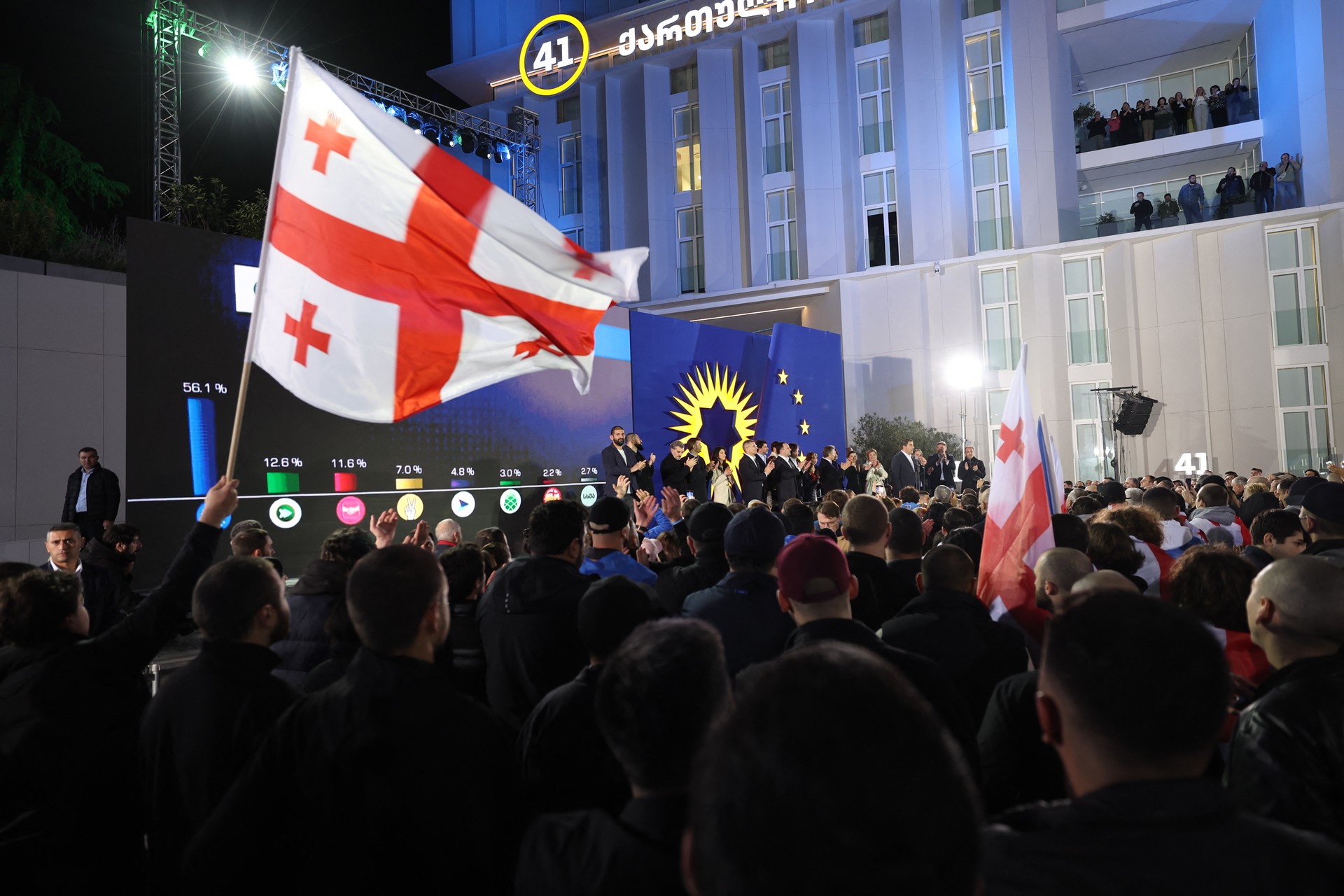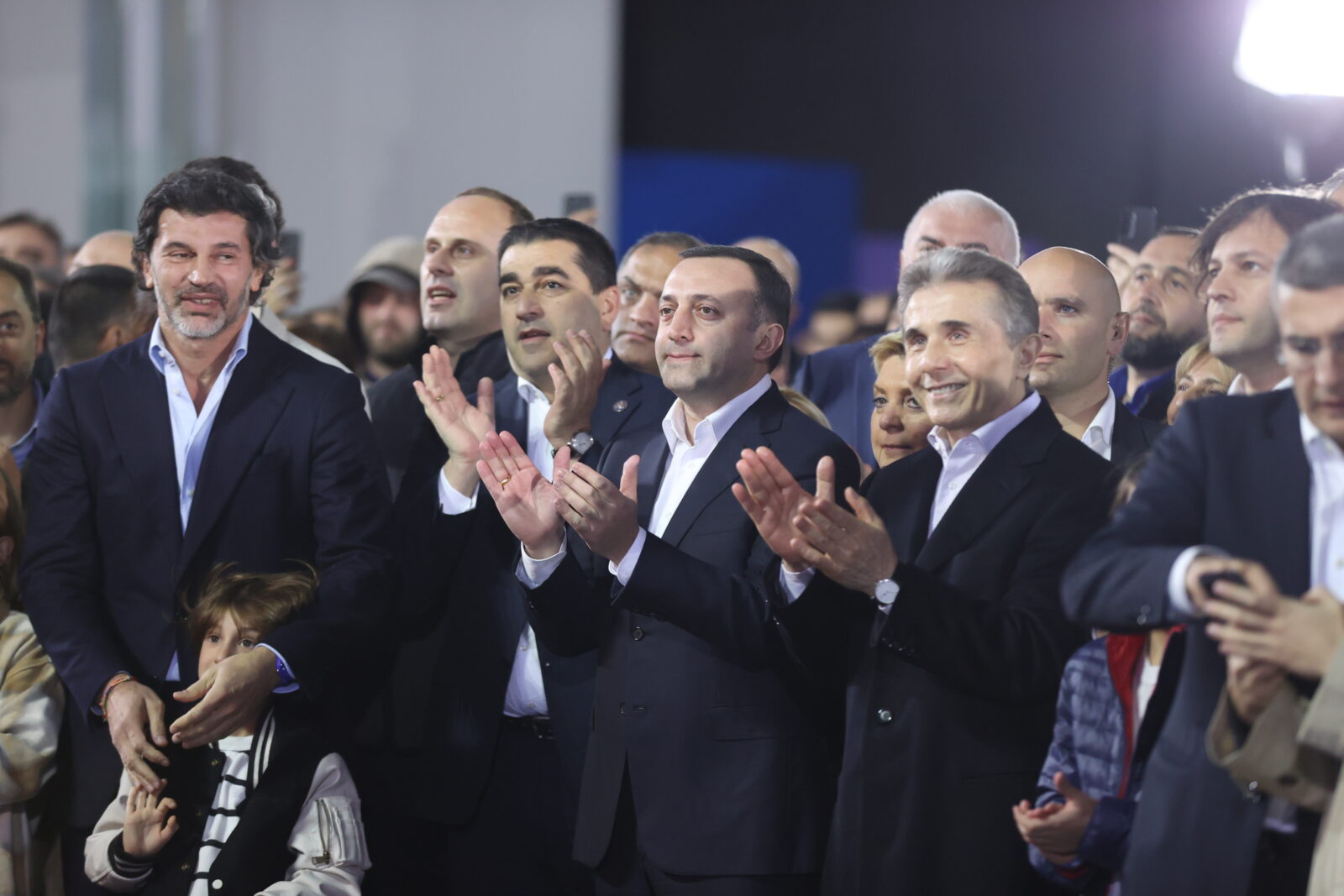
Georgia’s ruling party, Georgian Dream Pary, appears set to win a closely watched election Saturday, according to partial results. However, pro-Western opposition parties quickly rejected the results as “falsified,” labeling the situation a “constitutional coup.”
The preliminary results could signal a setback for Georgia’s aspirations to join the European Union and may shift the country toward closer ties with neighboring Russia. Brussels has been critical of Georgian Dream’s policies, indicating that the outcome could affect Georgia’s EU accession prospects.
With more than 70% of precincts reporting, the Central Election Commission reported Georgian Dream Party leading with 53% of the vote, while the main opposition coalition received 38%.
If these results hold, Georgian Dream would secure 89 seats in the 150-member parliament—enough to govern but not enough for an absolute majority needed for sweeping constitutional reforms. Final results are expected Sunday.
“Georgian Dream has secured a solid majority,” said party executive secretary Mamuka Mdinaradze.
Tina Bokuchava, leader of the opposition United National Movement, claimed the results were “falsified” and declared the election “stolen.” “This is an attempt to steal Georgia’s future,” she said.
Nika Gvaramia, leader of the Akhali party, characterized the situation as a “constitutional coup” by the government. “Georgian Dream will not stay in power,” he asserted.
https://twitter.com/Zourabichvili_S/status/1850208321430589658
The opposition has staged mass protests in recent months, claiming the government is undermining democratic freedoms and steering the country away from its pro-Western path.
Rival exit polls published after voting ended showed mixed results, with some favoring the ruling party and others indicating a lead for the opposition.
Pro-opposition President Salome Zourabichvili celebrated a victory for “European Georgia” despite reported “attempts to rig” the vote, following an exit poll that suggested the opposition won.
She pointed out that overseas ballots were still being counted.
“EuropeanGeorgiais winning with 52 % despite attempts to rigg elections and without votes from the diaspora,” she stated on X.
https://twitter.com/PM_ViktorOrban/status/1850208375960670271
In contrast, after another exit poll indicated a government win, Georgian Dream’s billionaire founder, Bidzina Ivanishvili, praised the party’s “success in such a difficult situation.” “I assure you, our country will achieve great success in the next four years. We will do a lot,” he said.
Hungary’s nationalist Prime Minister Viktor Orban commended Georgian Dream’s “overwhelming victory” on social media.

As voters in Tbilisi cast their ballots, opinions diverged on the nation’s future direction. Alexandre Guldani, an 18-year-old student, said, “Of course, I have voted for Europe. Because I want to live in Europe, not in Russia. So, I voted for change.”
Conversely, Giga Abuladze, who works at a kindergarten run by the Orthodox Patriarchate, expressed a desire for friendship with both Russia and Europe. “There is an opposition, and so be it, but it mustn’t be disruptive. We need to help each other,” said the 58-year-old, who praised Ivanishvili.
Georgian Dream, in power since 2012, initially pursued a liberal pro-Western agenda but has reversed course in recent years.
The party’s campaign has centered on conspiracy theories about a “global war party” controlling Western institutions and attempting to drag Georgia into the Russia-Ukraine conflict.
In a country still scarred by Russia’s 2008 invasion, Georgian Dream has invoked fears of an imminent threat of war, claiming only the ruling party can prevent it. In a recent TV interview, Ivanishvili portrayed a distorted image of the West, alleging “orgies are taking place right in the streets.”
The ruling party’s controversial “foreign influence” law, targeting civil society, sparked weeks of protests and was criticized as a Kremlin-style measure to silence dissent. This law prompted Brussels to freeze Georgia’s EU accession process, while Washington imposed sanctions on dozens of Georgian officials.
Additionally, the ruling party has launched a campaign against sexual minorities, implementing measures that ban LGBTQ “propaganda,” nullify same-sex marriages conducted abroad, and outlaw gender reassignment.
In contrast, the opposition coalition has outlined a pro-European policy platform advocating extensive electoral, judicial, and law enforcement reforms. They sought an interim multi-party government to push through these reforms before calling for new elections.